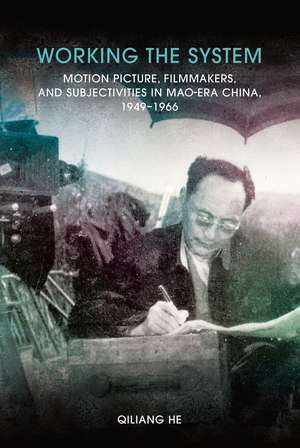Working the System: Motion Picture, Filmmakers, and Subjectivities in Mao-Era China, 1949–1966: Crossings: Asian Cinema and Media Culture
Autor Qiliang Heen Limba Engleză Hardback – 10 mar 2023
In Working the System, Qiliang He inquires into the making of the new citizenry in Mao-era China by studying five preeminent Shanghai-based filmmakers. These case studies shed light on how individuals’ subjectivities took shape in the cinematic arena under a new sociopolitical system after 1949. He suggests that a filmmaker’s subjectivity was not fixed or stable but constantly in flux, requiring a host of “subjectivizing practices” to (re)shape and consolidate it. These filmmakers endeavored to reap maximal benefits from Mao’s sociopolitical system and minimize the disadvantages that would make them victims under the system. In short, Qiliang He argues that the filmmakers not only worked under the socialist system imposed upon them but also worked the system in their best interests.
Preț: 407.11 lei
Preț vechi: 502.60 lei
-19% Nou
Puncte Express: 611
Preț estimativ în valută:
77.90€ • 83.30$ • 64.95£
77.90€ • 83.30$ • 64.95£
Cartea se retipărește
Doresc să fiu notificat când acest titlu va fi disponibil:
Se trimite...
Preluare comenzi: 021 569.72.76
Specificații
ISBN-13: 9789888805600
ISBN-10: 9888805606
Pagini: 180
Ilustrații: 8 halftones
Dimensiuni: 152 x 229 x 8 mm
Greutate: 0.4 kg
Editura: Hong Kong University Press
Colecția Hong Kong University Press
Seria Crossings: Asian Cinema and Media Culture
ISBN-10: 9888805606
Pagini: 180
Ilustrații: 8 halftones
Dimensiuni: 152 x 229 x 8 mm
Greutate: 0.4 kg
Editura: Hong Kong University Press
Colecția Hong Kong University Press
Seria Crossings: Asian Cinema and Media Culture
Notă biografică
Qiliang He is professor in the Department of History at Hong Kong Shue Yan University. He is the author of Newspapers and the Journalistic Public in Republican China: 1917 as a Significant Year of Journalism, Feminism, Women’s Agency, and Communication in Early Twentieth-Century China: The Case of the Huang-Lu Elopement, and Gilded Voices: Economics, Politics, and Storytelling in the Yangzi Delta since 1949.
Cuprins
List of Illustrations
Acknowledgments
Introduction
1. Wu Xun, Song Jingshi, and Lin Zexu: Cinema and Historiography in Mao’s China (1949–1966)
2. From Wu Xun to Lu Xun: Film, Stardom, and Subjectivity in Mao’s China
3. “Putting New Wine into Old Bottles”: Sun Yu’s Filmic Career in Post-1949 China
4. Wu Yonggang: Opera Film, the Cinematic Cold War, and Artistic Autonomy
5. The Making of Xie Jin in the PRC: Womanhood, Melodrama, and Co-authorship
Conclusion
Bibliography
Index
Acknowledgments
Introduction
1. Wu Xun, Song Jingshi, and Lin Zexu: Cinema and Historiography in Mao’s China (1949–1966)
2. From Wu Xun to Lu Xun: Film, Stardom, and Subjectivity in Mao’s China
3. “Putting New Wine into Old Bottles”: Sun Yu’s Filmic Career in Post-1949 China
4. Wu Yonggang: Opera Film, the Cinematic Cold War, and Artistic Autonomy
5. The Making of Xie Jin in the PRC: Womanhood, Melodrama, and Co-authorship
Conclusion
Bibliography
Index
Recenzii
"This is a well-researched study of five Shanghai-based filmmakers during Mao's China. It will be of interest to scholars and students of Chinese film history, modern Chinese history and the Cold War."
“Through five chosen filmmakers’ creative control and their negotiation of their professional status within China’s newly adopted socialist system, the author presents a compelling case that illustrates how individual filmmakers constantly adjusted themselves professionally and ideologically to survive in a fast-changing industry and a highly politicized society.”
“This book is a strong example of how much more we can learn about Mao-era Chinese culture if we approach it less as alien due to Cold War prejudices and instead think of artists as creating under professional constraints in China just as they do everywhere.”



